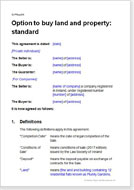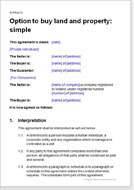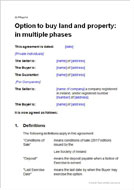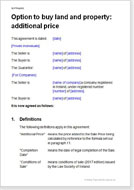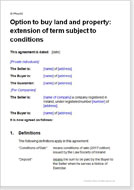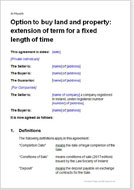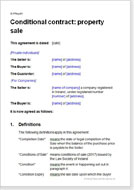The law says simply that an agreement to buy real property must be: in writing; signed by both parties; dated; and must identify the land being bought. It is this last point that catches people out when they create property option agreements. Too often boundaries, rights of retention and other matters are not defined in sufficient detail. We offer several variants on a option agreement that provide solid frameworks around which you can negotiate your deal.
Property option agreements
Option to buy land and property: standard
This is a comprehensive option agreement to buy real property - land or buildings - in a straight forward, “plain vanilla” deal.
This agreement fixes the price and the exercise date so that there is no scope for argument.
It creates a full contract for sale and purchase subject only to exercise of the option by the buyer.
Option to buy land and property: simple
This is a simple option agreement that creates a right to buy real property at a set price within a certain time period.
This version has been drawn specifically for situations where the buyer does not want to put the seller off the deal by giving him a document full of “legal” matters. Use if you fear that your seller may be overwhelmed. That way, you get a signature on this agreement.
Properly completed, signed and dated, this document is binding, but because this is a cut down version, there is less security for the buyer and there may be additional matters to consider in connection with the minutiae of the conveyancing process.
We include a template notice of exercise letter, to be used by a buyer to exercise the option before the expiry date stated within the agreement.
Option to buy land and property: in multiple phases
This agreement allows the option holder to exercise the option in stages so that he does not have to put out the entire exercise price in a single payment. He or she pays a fixed exercise price
Phases can be agreed in advance or calculated by reference to a proportionate part of the whole site.
Use this agreement on any occasion when you need to await some event. It could be simply planning approval, or it could be resolution of a dispute, grant of a licence relevant to this land, or simply an offer of financing.
The document includes protection for the buyer to prevent the option holder from controlling parts of the site which he has not yet bought.
It is suitable for buying any type of real estate, from agricultural land to derelict warehouses.
Example uses:
- the buyer will apply for consent on a large area of land, only in stages because the local planning authority is unlikely to allow development of the whole land area
- the buyer cannot fund the entire purchase before he has some cash flow from the first phase
- the buyer believes that planning consent on later phases may not be forthcoming for some reason outside his control
Option to buy land and property: additional price
This option agreement provides for the exercise price to be paid in stages as the buyer's development proceeds. This enables the seller to share in any uplift in valuation between the date of the grant of the option and the (later) exercise date. The template also includes a detailed sale contract incorporating the Law Society's Conditions of Sale (2017 Edition).
The ultimate sale price is not known in advance but is calculated after the event. For example, the buyer of the option wants to attempt to obtain planning permission. The seller wants a fair price - he does not want to see the buyer walk away with too large a share of “his” land value.
The price paid to the seller is calculated as a proportion of the increased value. The proportion is a matter for negotiation, reflecting the difficulty of raising the value and the risks and cost to the buyer in time and money.
An option buyer might use this document to give a property seller an additional incentive to act in some way to achieve the higher value outcome, or a seller might use it to ensure he or she shares in the whole profit and not just the first stage.
Example uses of this agreement: for buying land or buildings with a view to development after:
- planning permission (or other licence) has been granted
- finding a tenant
- negotiating with a local authority for a change in status of a listed part
- a land or building survey has been completed
- financing has been secured
Option to buy land and property: extension of term subject to conditions
This is a basic option agreement with the addition of one provision: it can be extended by the option holder subject to two things.
The first is an additional payment to the land owner, and the second is some other condition that you specify.
Use this agreement when there is some outstanding event which is a “deal breaker” for the option holder, for example, a decision to install a new sewerage disposal plant or to divert a road. Using this agreement, the option holder can extend the option period to make sure the condition is satisfied before he has to buy the land.
Option to buy land and property: extension of term for a fixed length of time
This option agreement builds on our standard agreement by providing for the option holder to extend the term of the option for a fixed length of time at a later date in return for an additional payment to the seller.
This template mitigates against the risk that the future event that is expected to increase the value of the property doesn’t occur as quickly as originally envisaged. It is therefore useful in situations where timing is uncertain.
Conditional contract: property sale
This is a conditional contract – where the entire deal is under contract and both sides are bound subject only to one or more conditions being met.
A conditional contract is an alternative to using an option agreement. An option places the option holder (usually the potential property buyer) in control of whether the property is sold. A conditional contract tends to favour the seller in that he knows he has sold subject only to the condition being met.
The most usual condition is a grant of planning permission.
The document includes an option for the seller to receive an additional payment in the future. This top-up provision gives a seller a stronger incentive to sell because he will have a second “bite of the cherry” if and when the buyer is able to generate more value later. For example, if the buyer cannot obtain planning permission for the whole site and instead seeks planning permission in stages, the seller can benefit from the increase in value of the land as a result of the subsequent grants of permission.
The document also includes an option to include a guarantor if the buyer is a company.

If the document isn’t right for your circumstances for any reason, just tell us and we’ll refund you in full immediately.

We avoid legal terminology unless necessary. Plain English makes our documents easy to understand, easy to edit and more likely to be accepted.

You don’t need legal knowledge to use our documents. We explain what to edit and how in the guidance notes included at the end of the document.

Email us with questions about editing your document. Use our Lawyer Assist service if you’d like our legal team to check your document will do as you intend.

Our documents comply with the latest relevant law. Our lawyers regularly review how new law affects each document in our library.
All rights reserved

